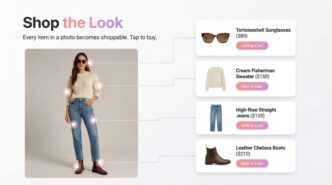The way we work is always changing, and it’s happening faster than ever. As we get closer to 2025, it’s clear that sticking to old ways just won’t cut it. We need to think about “meta careers,” which are basically jobs that need more than just one specific skill. This article will talk about how to do well in these meta careers, focusing on key skills, learning new things all the time, and making good connections with people.
Key Takeaways
- Meta careers are all about skills that you can use in lots of different jobs.
- Important meta skills include managing yourself, being good with people, and coming up with new ideas. These are useful everywhere.
- It’s a good idea to mix your regular job skills with these meta skills to really stand out.
- Making your own personal brand and meeting new people helps a lot in today’s job market.
- Always learning new things is super important. If you keep learning, you’ll stay good at what you do.
Understanding Meta Careers and Their Importance
Defining Meta Careers
Okay, so what exactly are "meta careers"? It’s a term you’re going to hear a lot more often. Basically, it refers to jobs that need a mix of technical skills and, more importantly, adaptable, human-focused skills. Meta careers emphasize skills that go beyond specific industries or technologies. It’s not just about what you know, but how you learn, adapt, and work with others. It’s about having a base that lets you quickly pick up new skills and adjust to changes. It’s less about having all the answers and more about knowing how to find them. For example, a project manager might need to understand agile methodologies (technical skill) but also needs to be great at communication and conflict resolution (meta skills) to keep the team on track. This blend is what defines a meta career.
The Role of Meta Skills in Career Development
Meta skills are super important for career growth. They’re the abilities that let you not only do your current job well but also change and take on new challenges. It’s about having a growth mindset and being able to learn, unlearn, and relearn as needed. Here’s why they matter:
- Adaptability: The job market is always changing. Meta skills help you stay relevant.
- Problem-solving: Hard problems need creative solutions. Meta skills boost your ability to think outside the box.
- Collaboration: Most jobs need working with others. Meta skills make you better at communicating and working well in teams.
Why Meta Careers Are Gaining Popularity
So, why are meta careers becoming so popular? Well, a few reasons. Technology is moving super fast, and many normal jobs are being automated. This means that the skills that are uniquely human – creativity, critical thinking, emotional intelligence – are becoming more important than ever. Companies are starting to realize that they need people who can change, solve hard problems, and work well with others. Meta skills are the answer. Plus, people are starting to value strong communication skills and always learning more than ever before. It’s not just about having a degree; it’s about being a lifelong learner and always growing your skills.
Key Meta Skills for Success in 2025

Okay, so 2025 is just around the corner, and the skills you need to kill it in your career are shifting. It’s not just about what you know, but how you learn, adapt, and play well with others. Let’s break down some key meta skills you’ll need.
Self-Management and Adaptability
Self-management? That’s all about getting your act together. Understanding your strengths, weaknesses, and how you tick. Adaptability is being able to roll with the punches when things change. These two go hand-in-hand. Think about it:
- Time management: Can you actually get stuff done?
- Stress management: How do you handle pressure without losing it?
- Goal setting: Do you even know what you’re aiming for?
Social Intelligence and Collaboration
Social intelligence isn’t just about being nice. It’s about understanding people, reading the room, and working effectively in teams. Collaboration is key. No one succeeds alone, right? Strong communication skills are a must. Consider these aspects:
- Empathy: Can you put yourself in someone else’s shoes?
- Communication: Are you able to clearly express your ideas?
- Conflict resolution: Can you navigate disagreements without things blowing up?
Innovation and Problem-Solving
Innovation is about coming up with new ideas. Problem-solving is about tackling challenges head-on and finding solutions. Companies want people who can think outside the box and drive change. Continuous skill development is key. It’s about thinking outside the box and not being afraid to challenge the status quo. You need to be able to look at a problem and see possibilities that others might miss. Consider these aspects:
- Critical Thinking: Analyzing information and making informed decisions.
- Design Thinking: Understanding user needs and creating innovative solutions.
- Experimentation: Testing new ideas and learning from results.
Integrating Traditional and Meta Skills
It’s easy to think of traditional skills and meta skills as totally separate things, but honestly, they really work best when they’re combined. You can’t really kill it in a Meta career by only knowing one or the other. It’s all about finding the right mix and knowing how to use them together.
Complementary Skill Sets
Think of meta skills as the thing that makes your traditional skills even better. For example, if you’re a data analyst (traditional skill), having strong communication skills and collaboration skills (meta skills) will help you work better in a team and explain your findings clearly. It’s about how these skills boost each other. It’s like peanut butter and jelly, or coffee and donuts – good on their own, but amazing together.
Highlighting Skills in Job Applications
When you’re applying for jobs, don’t just list your technical skills. Make sure to also show off your meta skills. Give examples of when you’ve used them. Did you lead a team project? Did you come up with a creative solution to a problem? These are the things that will make you stand out. You can also mention your skill development in your resume. I mean, who doesn’t want someone who can not only do the job, but also play well with others?
Demonstrating Skills in Interviews
Interviews are your chance to really shine. Don’t just say you have certain skills; prove it. Use the STAR method (Situation, Task, Action, Result) to explain how you’ve used your meta skills in the past. For example, talk about a time you had to adapt to a sudden change in a project, or how you resolved a conflict within a team. These stories will show the interviewer what you’re really capable of. It’s like showing, not telling, but for your career. And trust me, interviewers eat that stuff up.
Navigating the Evolving Job Market
It’s a bit of a rollercoaster out there, isn’t it? The job market is changing so fast it can feel like you’re trying to catch smoke. But don’t sweat it; with the right mindset, you can not only keep up but actually get ahead. Let’s look at how to stay on top of things.
Identifying Emerging Opportunities
First off, keep your eyes open. What’s popular today might be old news tomorrow. Pay attention to industry news, tech blogs, and even just talking with people in different fields. Hearing a lot about AI in unexpected places? A sudden need for sustainability experts? These are clues. Keeping an eye on labor force trends trends is a great way to stay ahead of the curve.
- Follow the big names: See what they’re talking about and where they’re putting their money.
- Use job sites smartly: Don’t just apply; look at the skills companies are asking for.
- Talk to people! You’d be surprised what you can learn just by chatting with someone.
Adapting to Industry Shifts
The job market isn’t what it used to be. It’s always changing, and that means industries are changing too. To stay relevant, you need to be ready to change with it. This means keeping up with new trends, understanding how tech is changing, and being willing to learn new things. It’s not enough to just stick to what you know; you have to be ready for what’s coming next.
Leveraging Your Unique Strengths
Everyone’s got something that makes them special. Maybe you’re a great problem-solver, a natural leader, or a whiz with data. Whatever it is, find a way to use it to your advantage. Don’t try to be someone you’re not; instead, focus on what you do best and how you can use those skills to stand out. Think about how your skills can be applied in different ways or in different industries. This can open up opportunities you might not have thought of before.
Building Meaningful Professional Relationships

It’s easy to underestimate how important good relationships are for your career. It’s not just about knowing a bunch of people; it’s about making real connections that help you grow, and help them grow too. In the world of meta careers, this is even more important. You aren’t just looking for a job; you’re looking for a community. Professional networking can really help you out.
Networking Strategies for Meta Careers
Networking isn’t just about collecting business cards. It’s about making real connections with people. Think of it as building a support system, not just a list of contacts.
- Go to industry events, both online and in person. Look for smaller gatherings where you can actually talk to people.
- Use social media like LinkedIn to connect with people in your field. Don’t just send a generic request; say something specific about their work that you like.
- Offer to help people. Networking goes both ways. If you can help someone out or introduce them to someone, do it. This builds trust and makes your relationships stronger.
Collaboration in Diverse Teams
Meta careers often mean working with diverse teams, sometimes all over the world. This means you need to be good at working with people from different backgrounds and with different skills. Understanding and respecting these differences is super important.
- Really listen to what people are saying. Make sure you understand your teammates, even if they communicate differently than you do.
- Be open to new ideas. Don’t just dismiss suggestions because they’re not familiar. Different perspectives can lead to better solutions.
- Communicate clearly and respectfully. Avoid using jargon or slang that others might not understand. Be aware of cultural differences in how people communicate.
Seeking Mentorship and Guidance
Finding a mentor can really change your career. A mentor can give you advice, support, and insights based on their own experiences. But mentorship isn’t just one way. Think about becoming a mentor yourself. Sharing what you know can be really rewarding, and it can also help you improve your own skills. A life coach can also help you find a mentor.
Consider these points when seeking or offering mentorship:
- Define your goals: What do you want to get out of mentorship? What kind of advice are you looking for?
- Find the right match: Look for someone who has experience in the areas you’re interested in and who you feel comfortable talking to.
- Be proactive: Don’t just wait for your mentor to tell you what to do. Come prepared with questions and ideas.
Embracing Lifelong Learning for Meta Careers
It’s 2025, and if you’re not learning, you’re falling behind. Seriously. The job market isn’t static; it’s a living, breathing thing that changes constantly. To stay relevant in meta careers, you need to commit to being a lifelong learner. It’s not just about getting a degree and calling it a day. It’s about continuously growing, adapting, and picking up new skills. Think of it as career insurance. Lifelong learning is the key to unlocking new opportunities and staying ahead of the curve.
Strategies for Continuous Skill Development
Okay, so how do you actually do this lifelong learning thing? It’s not as daunting as it sounds. Here are a few ideas:
- Set aside dedicated learning time: Treat it like a meeting you can’t miss. Even 30 minutes a day can make a difference. Maybe use that time to improve your communication skills.
- Embrace microlearning: Short, focused bursts of learning. Think YouTube tutorials, podcasts, or quick articles. Perfect for busy schedules.
- Seek feedback: Ask for input on your work. Constructive criticism is a gift. It helps you identify areas for improvement.
Utilizing Online Learning Platforms
Online learning platforms are a game-changer. They offer a huge range of courses and resources, often at a fraction of the cost of traditional education. Plus, you can learn at your own pace, on your own schedule. It’s all about finding what works for you. Here’s a quick comparison of some popular platforms:
| Platform | Focus | Cost |
|---|---|---|
| Coursera | University-level courses, degrees | Varies, some free courses available |
| Udemy | Practical skills, professional development | Affordable, frequent sales and discounts |
| LinkedIn Learning | Business, tech, creative skills | Subscription-based |
Staying Current with Industry Trends
Staying up-to-date with industry trends is crucial. What’s hot right now? What’s on the horizon? You need to know. Here’s how:
- Follow industry leaders: On social media, blogs, and newsletters. See what they’re talking about.
- Attend webinars and conferences: Even virtual ones. It’s a great way to learn from experts and network with peers. Look for growth mindset workshops.
- Read industry publications: Trade magazines, journals, and online news sites. Stay informed about the latest developments.
Wrapping Things Up
So, as we look ahead, it’s pretty clear that the job world is always changing. It’s not just about what you know anymore, but how well you can pick up new things and work with others. Those "meta skills" we talked about? They’re super important for staying on top of things. If you keep learning, stay open to new ideas, and build good connections, you’ll be in a great spot. It’s like, you’re not just getting ready for one job, but for whatever comes next. Just keep at it, and you’ll do fine.
Frequently Asked Questions
What exactly are “meta careers”?
Meta careers are jobs that need a mix of regular skills and special ‘meta’ skills. These ‘meta’ skills help you learn, change, and work well with others, no matter the job or industry.
Why are meta skills so important for future jobs?
Meta skills are like super-skills that help you in many different jobs. They are things like managing yourself, working with others, and solving problems in new ways. They’re important because the world of work is always changing, and these skills help you keep up.
How are meta skills different from regular job skills?
Meta skills are different because they are not tied to one specific job. For example, knowing how to code is a regular skill. But being able to quickly learn a new coding language is a meta skill. Meta skills help you adapt and grow in any field.
How can I show employers I have strong meta skills?
You can show off your meta skills by giving examples. When you write your resume or talk in an interview, tell stories about times you had to learn something new fast, work with a difficult team, or solve a tricky problem. This shows you have those important meta skills.
Why is it important to keep learning throughout your career?
Learning new things all the time, or “lifelong learning,” is super important. It means you’re always ready for new challenges and changes in your job. It keeps your brain sharp and makes you valuable to any company.
What’s the best way to build strong relationships at work?
To build good work relationships, try to meet new people in your field, either online or in person. Be a good listener and be open to new ideas when you work in teams. Also, find someone who can guide you, like a mentor, to help you grow.














